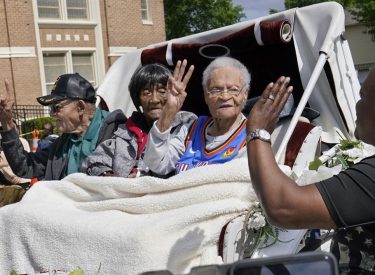Oklahoma Judge Rules Tulsa Race Massacre Victims’ Descendants Can’t Sue
Associated Press - August 5, 2022 6:28 am

Tulsa Race Massacre survivors, from left, Hughes Van Ellis Sr., Lessie Benningfield Randle, and Viola Fletcher.
An Oklahoma judge said six descendants of victims of the 1921 Tulsa Race Massacre cannot sue for reparations, while allowing three known survivors of the attack in which a white mob descended on a predominantly Black neighborhood to move forward with the lawsuit.
The order, signed Tuesday by Tulsa County District Judge Caroline Wall, allows Lessie Benningfield “Mother” Randle, 106, Viola “Mother” Fletcher, 107, and Hughes Van Ellis, Sr., 101, to continue seeking reparations under state nuisance laws.
Wall in May allowed the case to go forward while partially granting a motion to dismiss it without saying at the time what was being dismissed.
In addition to the six descendants, Wall dismissed as plaintiffs the Historic Vernon AME Church Inc., which did not exist in 1921, and The Tulsa African Ancestral Society, which represents other descendants. And she dismissed as defendants the Tulsa Development Authority and the Tulsa Metropolitan Area Planning Commission because they did not exist in 1921.
Wall also dismissed an “ongoing public nuisance” claim by the plaintiffs.
The city of Tulsa, Tulsa Regional Chamber, Tulsa County commissioners, the Tulsa County sheriff and the Oklahoma Military Department remain as defendants.
The massacre occurred when a white mob descended on a 35-block area in Tulsa’s then-prosperous Greenwood District, killing up to an estimated 300 people, most of whom were Black, and looting and burning businesses and homes. Thousands were left homeless and living in a hastily constructed internment camp.
Wall’s order calls for attorneys on both sides to amend the claim for reparations, which sought unspecified punitive damages and called for the creation of a hospital in north Tulsa, in addition to mental health and education programs and a Tulsa Massacre Victims Compensation Fund.
“Bottom line is that survivors are in, we have the opportunity to prove the massacre itself … constitutes a nuisance,” said Damario Solomon-Simmons, an attorney for the survivors who filed the lawsuit in 2020.
Lawyer Damario Solomon-Simmons

Solomon-Simmons said the massacre deprived Black people in Tulsa of security, economic power and vibrant community.
“We look forward to proving our case around the massacre’s ongoing catastrophic effects and demonstrating the actions that defendants must take to repair and rebuild the Greenwood community during our clients’ lifetimes,” Solomon-Simmons said.
Solomon-Simmons said during a news conference that he has spoken with those who were dismissed from the lawsuit.
“They were saddened they were dismissed out, but they are still very excited, heartened by the fact that we are moving forward and that these survivors can represent the entire community of Greenwood,” Solomon-Simmons said.
Michael Swartz, another attorney for the survivors, said the case provides an opportunity for a better understanding of the massacre.
“For the first time in over 100 years, the last three living survivors of the Tulsa Race Massacre will finally have an opportunity to hold accountable the institutions that instigated and facilitated one of the worst acts of domestic terrorism in this country’s history,” Swartz said.
The city and insurance companies never compensated victims for their losses, and the massacre ultimately resulted in racial and economic disparities that still exist today, the lawsuit claims. In the years following the massacre, according to the lawsuit, city and county officials actively thwarted the community’s effort to rebuild and neglected the Greenwood and predominantly Black north Tulsa community in favor of overwhelmingly white parts of Tulsa.
The massacre received renewed attention in recent years after then-President Donald Trump selected Tulsa as the location for a 2020 campaign rally amid a reckoning over racism. Trump moved the date of his June rally to avoid coinciding with a Juneteenth celebration in the city’s Greenwood District commemorating the end of slavery.
Associated Press reporter Jake Bleiberg in Dallas contributed to this report.



